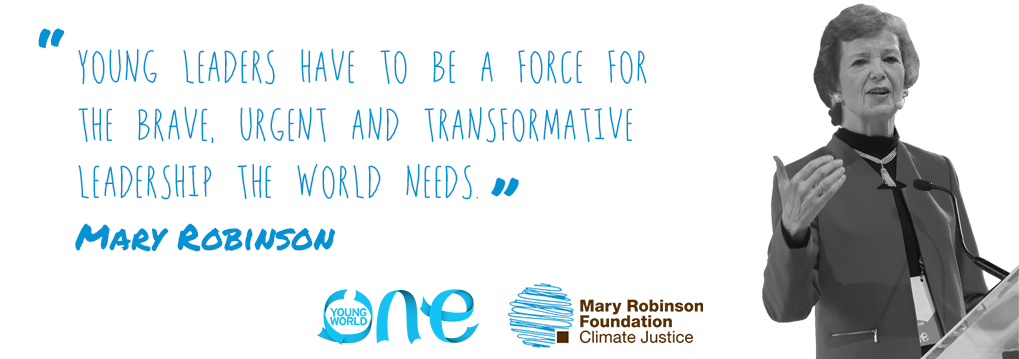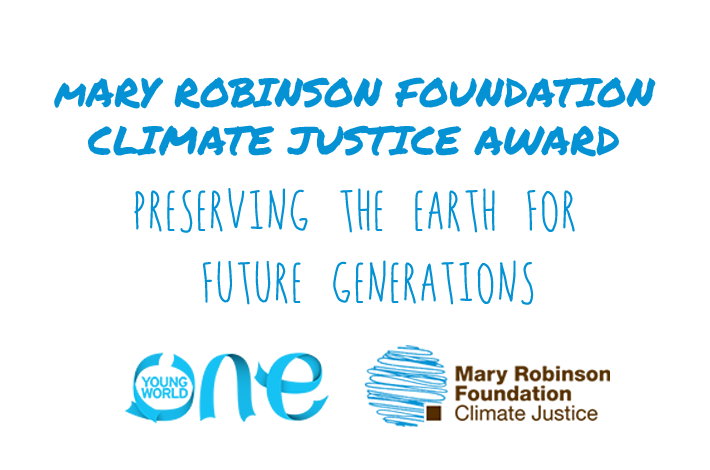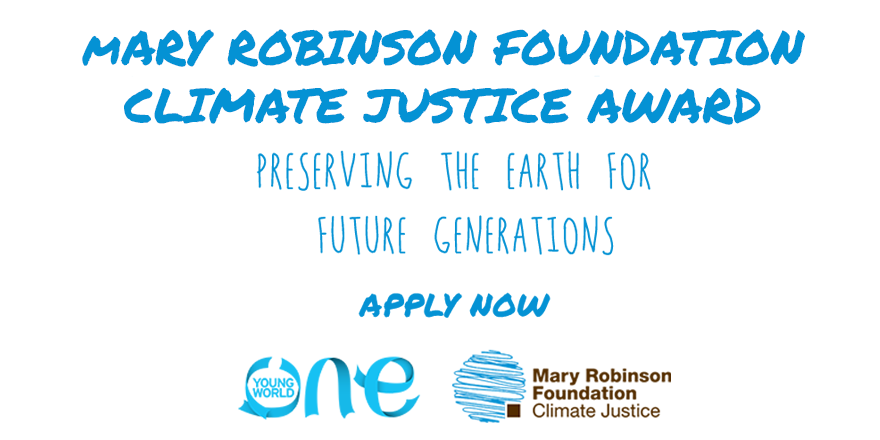
For the second year running One Young World is teaming up with the Mary Robinson Foundation - Climate Justice to support young leaders behind innovative and impactful climate justice initiatives that are preserving the earth for future generations.
The impact of climate change is not a distant threat, its effects are being felt right now by millions around the world in the form of rising sea levels, extreme weather systems and devastating droughts. The sorry truth is that those most affected by climate change are those who are least responsible for its causes and least well equipped to withstand its effects. The carbon emissions of the United States, for example, are 118 times the size of Nauru’s but this small Pacific island is one of the nations at risk of disappearing due to rising sea levels.
The situation might sound gloomy but the good news is that there are hundreds of thousands of people and organisations working to tackle climate change and address the global imbalance it is creating. This is the climate justice movement and One Young World is proud to be a part of it.
If you are leading a climate justice project within your community or organisation you can apply for the Mary Robinson Foundation - Climate Justice Award today for the chance to win:
- A £5,000 grant to support or launch your project.
- A fully sponsored delegate place to attend the One Young World Summit 2017 in Bogotá. During the Summit you will appear alongside Mary Robinson to present your initiative to the world’s media and 1,300 fellow change makers from 196 countries.
About the award
This year’s edition of the award seeks to support projects that focus on creating intergenerational equity.
Climate justice links human rights and development to achieve a human-centred approach, safeguarding the rights of the most vulnerable and sharing the burdens and benefits of climate change and its resolution equitably and fairly. Climate justice is informed by science, responds to science and acknowledges the need for equitable stewardship of the world’s resources.
Climate justice also requires intergenerational equity. This requires us not just to tackle the issue of climate change head on, but that we also build a world in which the young and those generations yet to come are able to live within planetary boundaries and experience the full enjoyment of their rights.
Professor Edith Brown Weiss of Georgetown University defines the principle of intergenerational equity as follows: “the basic concept is that all generations are partners, caring for and using the Earth. The present generation must pass the Earth and our natural and cultural resources on in at least as good condition as it received them, so that future generations can meet their own needs.”
Many of the international agreements such as the Sustainable Development Goals, the Paris Climate Agreement and the 1992 Rio Declaration on the Environment and Development espouse a commitment to intergenerational equity. The challenge now is turning the commitments made in these international agreements into practice to achieve climate justice. Doing so requires careful balancing to meet the current challenges of poverty eradication, hunger, inequality and conflict, while ensuring that decisions taken now are beneficial to future generations and protect the planet.
How to apply
Applying is simple, just complete the online application form linked below before 1 May 2017. Applications will be shortlisted by One Young World and shortlisted applicants will be invited to an online interview with Mary Robinson and One Young World co-founder Kate Robertson who will decide the award winner.
Make sure to carefully read the criteria for entry below before you apply.
Application deadline: 1 May 2017
Criteria for Entry
To be eligible for the award you must be aged 18 – 30 and your project should advance the following criteria:
1) Directly addresses sustainable development and/or climate change with a particular emphasis on balancing the needs of present and future generations – this could be through financing, frontline services, advocacy, education, communication, legal/policy change or a business solution. Some indicative suggestions are:
- A climate or development initiative that addresses poverty reduction and has included ways to measure the benefits and impacts of the initiative for both present and future generations
- An initiative that sets out to raise awareness on the need to address the current challenges of poverty reduction while ensuring future generations enjoy the same natural and cultural resources as we do today
- A project that sets out to conserve or sustainably manage natural and cultural heritage for use by current generations but also with a specific objective of preserving these for future generations
- A project or action at local, national or international level that sets out to advocate or promote the representation of future generations or act as guardians for future generations.
2) Projects should be clearly associated with one or more of the seven principles of climate justice:
- Respect and protect human rights
- Support the right to development
- Share benefits and burdens equitably
- Ensure that decisions on climate change are participatory, transparent and accountable
- Highlight gender equality and equity
- Harness the transformative power of education for climate stewardship
- Use effective partnerships to secure climate justice
3) Additional assessment criteria that will be applied in awarding the Prize are:
- Ambition of the project – how impactful your project is in balancing needs of present and future generations
- Relevance – the project is grounded in climate justice and addresses intergenerational equity
- Community value – the project applies to a community/communities / stakeholder group who are directly impacted by climate change or will be more adversely impacted in the future
#SeeingBlue: Mary Robinson Foundation Climate Justice Award 2016 winners
#SeeingBlue aims to train and empower young people in Small Island Developing States to become active protectors of their countries’ most valuable resource, the ocean. The project is led by One Young World Ambassadors Angélique Pouponneau, Barkha Mossae and Karuna Rana.
As the world’s main carbon sink and SIDS’ primary source of livelihood, healthy oceans are critical to turning the tide on climate change. However, it is a sad fact that there still exists a disconnect between SIDS-based youth and the ocean, as evidenced by the low numbers of them who can swim and by their limited participation in decision-making around the ocean.
#SeeingBlue’s Young Ocean Champion Award calls for project ideas that address threats to the ocean thereby incentivising young people to reflect on oceans, climate change and conservation. Winners of the award undergo an intensive capacity-building programme to enable them to bring their project to fruition.
Currently operating in Mauritius, the grant from the Mary Robinson Foundation Climate Justice Award will enable #SeeingBlue to expand to the Seychelles in 2017. Learn more about #SeeingBlue here.
Learn more about climate justice and intergenerational equity
- Read more about climate justice principles here
- Read more about the Mary Robinson Foundation – Climate Justice’s work on intergenerational equity here.
- Other recommended reading:
- http://www.stockholmresilience.org/research/planetary-boundaries/planet…
- https://www.worldfuturecouncil.org/
- http://www.futurepolicy.org/
- http://www.oxfordmartin.ox.ac.uk/policy/commission/
- http://www.vofg.org/
- https://www.ourchildrenstrust.org/



